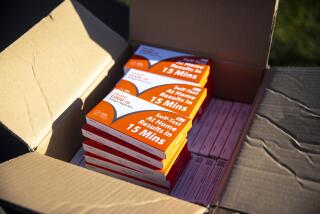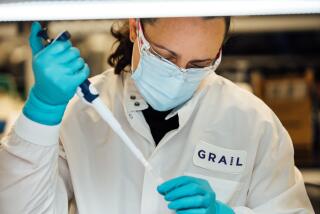Unilab Has a History of Billing Problems : Health care: A computer foul-up cost the Tarzana medical testing firm $12 million. The company has been subpoenaed in a federal inquiry.
- Share via
Unilab Corp., one of several large medical-testing companies subpoenaed last month in a federal investigation of possible abuses of Medicare and Medicaid claims, got in trouble for its billing practices a year ago.
But that trouble was with its shareholders.
Unilab, which does everything from Pap smears to AIDS blood tests, had problems last year installing a new computerized billing system at its Northern California labs. Instead of streamlining things, a software foul-up caused the Tarzana-based company to send out loads of incorrect bills to its physician-clients, and forced Unilab to take a $12-million charge against its 1992 second-quarter earnings.
So many doctors got upset at patients calling to complain that “we decided to write off the $12 million instead of trying to go back and re-create all the bills,” said James Lawrence, president of Unilab’s Met-West California unit, also in Tarzana.
The snafu also caused Unilab to miss deadlines for submitting many of those bills for federal reimbursement. “Medicare probably owes us money,” Lawrence joked.
Many investors dumped the company’s stock a year ago when Unilab announced that the billing problems would hurt its results for all of 1992. As it turned out, another $78 million of charges were posted against the company’s earnings, mainly to acquisitions, resulting in Unilab’s 1992 net loss of $98 million on $214 million of revenue.
*
Unilab’s stock has never recovered. From $11 a share in early 1992, the stock has since traded as low as $4.25 in the over-the-counter market. The price had inched back up to $7.25 when the Medicare inquiry became known two weeks ago. But Unilab’s shares fell $1.25 on Aug. 27, when the company said it expected to be subpoenaed in the federal-reimbursement audit.
Unilab closed Friday at $6.63 a share. (The stock market was closed Monday because of the Labor Day holiday.)
The U. S. Department of Health and Human Services is trying to determine whether any medical-testing companies have submitted possible false or improper claims under the Medicare and Medicaid programs.
Along with Unilab, other companies that have been subpoenaed include Unilab’s biggest shareholder, Corning Inc., of Corning, N. Y., and its Teterboro, N. J.-based Metpath Inc. unit; Nichols Institute in San Juan Capistrano; London-based SmithKline Beecham PLC’s Clinical Laboratories in Philadelphia; and Nashville, Tenn.-based Allied Clinical Laboratories Inc.
Unilab was formed in 1988 through a joint venture by Metpath, which had four small labs in California and other Western states, and an investor group. The labs had revenues of about $65 million.
Since then, it has grown quickly, largely through acquisitions. Unilab is now the largest medical-testing company in Southern California and sixth-largest in the nation. Its facilities include six full-service labs, 50 emergency labs and 200 blood-drawing stations in California, Texas, Arizona and Colorado.
Lawrence, who came to Unilab from Metpath along with Unilab’s chief executive Andrew H. Baker, said Unilab will cooperate fully in the Medicare investigation.
Unilab previously disclosed that it has been cooperating for about two years with the civil division of the Department of Justice in a similar examination of the lab industry’s billing practices.
Depending on how much Medicare will pay for certain tests, sometimes labs group various tests into one bill; other times they bill Medicare separately for each test, with the hope of getting the maximum Medicare payment possible.
In December, La Jolla-based National Health Laboratories Inc. agreed to pay $111.4 million to the government after pleading guilty to filing false claims to Medicaid and the Civilian Health and Medical Program of the Uniformed Services.
The current federal investigation appears “to be a response by the government to what they saw at National Health Labs,” said Richard Jabbour, an analyst at Edward D. Jones & Co. in Maryland Heights, Mo.
*
The cloud of federal scrutiny that has already been hanging over the medical-testing industry may hold the stocks of these companies down for some time. Their future is also uncertain, of course, because of health-care reform.
As a result, many investors are shying away from these stocks. New York-based Gabelli Growth Fund, which owned 100,000 shares of Unilab in June, has since sold them all.
“It’s not that I don’t think Unilab is a good company,” said Elizabeth R. Bramwell, president of Gabelli Growth. “I just wanted to reduce my exposure to health care because I don’t think it’s possible to analyze the industry right now,” given President Clinton’s pending health care reform plan.
But some other analysts rate Unilab’s stock a “hold” for those who own it or even a “buy” for investors with some patience.
Analyst Jabbour is still bullish on a Unilab restructuring plan that the company agreed to earlier this year that includes selling its non-California labs to Corning. In exchange, Corning will assume $70 million of Unilab’s $93 million of debt and reduce its ownership in Unilab to about 12% from 43%.
The restructuring will immediately cut Unilab’s revenues in half. But it will also reduce the number of its shares outstanding by about 22%.
The plan is being reviewed by the Securities and Exchange Commission, Lawrence said. Unilab hopes to submit it for shareholder approval by the end of the year.
Jabbour expects Unilab to earn about $12.6 million on $230 million of revenue for all of 1993.
Next year, if the restructuring occurs so Unilab shrinks in size, he looks for the company to earn about $11 million on $145 million of revenue.
Houston Hall, a money manager in Dallas, Tex., has increased his Unilab holdings to 2.5 million shares from 300,000 in the past year.
In November, Hall was predicting that Unilab’s shares would hit $12 to $15 within 12 months.
“Guess I was wrong,” Hall said. But, he adds, he still likes the company.
Why? He said simply, “I still own the stock. That speaks for itself.”
More to Read
Inside the business of entertainment
The Wide Shot brings you news, analysis and insights on everything from streaming wars to production — and what it all means for the future.
You may occasionally receive promotional content from the Los Angeles Times.










